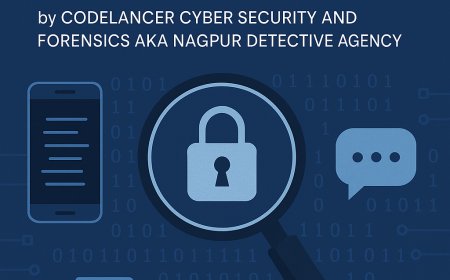Future Trends of Digital Forensics in Cybersecurity
The blog "Future Trends of Digital Forensics in Cybersecurity" explores the evolving landscape of digital forensics, highlighting key trends such as AI integration, mobile and cloud forensics, and the growing complexity of cybercrimes. As the digital environment becomes more sophisticated, businesses must stay ahead by adopting advanced forensic tools to enhance security and ensure compliance. This blog is brought to you by Codelancer.

Digital forensics plays a vital role in helping organizations investigate and mitigate cybercrime, data breaches, and other malicious activities. As the digital landscape evolves, so do the tools and techniques used in forensic investigations. This blog explores the future trends in digital forensics, highlighting how emerging technologies and new challenges will shape the field.
Why the Future of Digital Forensics is Crucial in Modern Cybersecurity
1. Increasing Cybercrime Complexity: As cybercriminals become more sophisticated, digital forensics must evolve to keep up. Investigations need to adapt to new techniques used by attackers, such as encryption, data manipulation, and AI-driven attacks.
2. Expanding Use of IoT Devices: The Internet of Things (IoT) introduces new opportunities for digital forensics. With more devices connected to networks, forensic investigators will increasingly need to analyze data from these devices to trace malicious activities and secure sensitive data.
3. Emerging Privacy Regulations: Privacy laws such as GDPR and CCPA are constantly evolving, which means digital forensics must remain compliant with these regulations when collecting, analyzing, and reporting on digital evidence.
Key Features of Future Digital Forensics
1. Advanced Data Recovery and Analysis: Future digital forensics will rely on advanced data recovery techniques to retrieve data from damaged devices, cloud platforms, or encrypted files. New tools will continue to push the limits of data extraction to ensure no critical evidence is overlooked.
2. AI and Machine Learning Integration: AI and machine learning will become increasingly important in digital forensics. These technologies can assist investigators by automating repetitive tasks, detecting patterns in vast datasets, and predicting potential security threats in real-time.
3. Cloud Forensics: With organizations shifting to cloud services, digital forensics must evolve to handle cloud-based data. Forensic investigators will need to develop tools that can access and analyze cloud data while maintaining compliance with legal regulations.
4. Mobile Device Forensics: As mobile device usage continues to grow, mobile forensics will play a significant role in future investigations. Advancements will focus on overcoming the challenges of unlocking and analyzing encrypted mobile devices, especially as they become more secure.
How Future Digital Forensics Supports Cybersecurity
1. Proactive Threat Detection: Future digital forensics will allow cybersecurity teams to detect and mitigate potential threats in real-time by analyzing network traffic, user behavior, and system anomalies, thereby strengthening overall defenses.
2. Incident Response and Recovery: In the event of a breach, digital forensics will help organizations trace the source, understand the methods used, and recover lost data. This will enable faster recovery and minimize the impact of cyberattacks.
3. Risk Mitigation and Prevention: By leveraging advanced forensic tools, organizations will be able to identify vulnerabilities before they can be exploited, allowing them to implement better preventive measures.
4. Compliance and Legal Reporting: Digital forensics will continue to play a critical role in ensuring compliance with various cybersecurity and privacy regulations. The ability to produce clear, accurate, and legal reports will be essential for legal proceedings.
Why Organizations Need to Invest in Future Digital Forensics
As cyberattacks grow more sophisticated, organizations must prioritize investment in digital forensics tools and expertise. Here's why businesses need to stay ahead of digital forensics trends:
- Expert Analysis: Skilled forensic investigators are essential to navigate the complexities of future digital threats. Their ability to analyze vast amounts of data and extract actionable insights will be crucial to addressing modern cybersecurity challenges.
- Rapid Response: The faster an organization can detect and respond to a cybercrime, the less damage will occur. By investing in digital forensics, businesses can ensure swift incident response and recovery.
- Adaptation to New Technologies: As new technologies emerge, forensic experts must be equipped to handle new data types, from IoT devices to cloud environments, ensuring that all aspects of the business are secure.
Strengthen Your Business with Future Digital Forensics
Digital forensics is an evolving field that plays an integral role in protecting businesses from cyber threats. By staying ahead of trends and investing in the right forensic tools and experts, organizations can ensure their data remains secure, protect their reputation, and comply with legal regulations.
Contact us today to learn how our advanced digital forensics services can help safeguard your organization’s future and protect it from cybercrime.
For more information or to inquire about our services, visit our website or reach out to us directly. Protect your business from cyber threats with expert digital forensics investigations!
What's Your Reaction?








































